| Listing 1 - 10 of 54 | << page >> |
Sort by
|
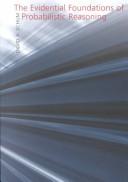
ISBN: 0810118211 9780810118218 9780810118218 0810118211 Year: 2001 Publisher: Evanston (Ill.): Northwestern university press,
Abstract | Keywords | Export | Availability | Bookmark
 Loading...
Loading...Choose an application
- Reference Manager
- EndNote
- RefWorks (Direct export to RefWorks)
No matter how irrefutable it may seem, evidence is often a matter of interpretation. Incomplete, inconclusive, imprecise, or vague, it is nonetheless the basis of myriad everyday conclusions and decisions. In this authoritative work, David A. Schum develops a general theory of evidence as it is understood and applied across a broad range of disciplines and practical undertakings. Synthesizing insights from law, philosophy and logic, probability, semiotics, artificial intelligence, psychology, and history, Schum provides a detailed examination of the various properties and uses of evidence and the evaluative skills evidence requires. Along with the evidential subtleties of probabilistic reasoning, Schum also explores the processes by which evidence is generated or discovered and looks at the intellectual and practical underpinnings of probabilistic reasoning. It is a useful resource for students, researchers, and practitioners of every discipline concerned with evidence and its inferential use.
Probabilities --- Evidence --- Inference

ISBN: 0792366743 Year: 2001 Publisher: Dordrecht : Kluwer academic,
Abstract | Keywords | Export | Availability | Bookmark
 Loading...
Loading...Choose an application
- Reference Manager
- EndNote
- RefWorks (Direct export to RefWorks)
Book
ISBN: 094060051X Year: 2001 Volume: 37 Publisher: Beachwood, Ohio Institute of Mathematical Statistics
Abstract | Keywords | Export | Availability | Bookmark
 Loading...
Loading...Choose an application
- Reference Manager
- EndNote
- RefWorks (Direct export to RefWorks)
Mathematical statistics --- Stochastic processes --- Inference --- Processus stochastiques --- Congresses. --- Congrès
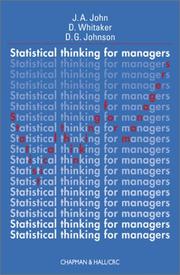
ISBN: 1584882484 9781584882480 Year: 2001 Publisher: Boca Raton: Chapman & Hall/CRC,
Abstract | Keywords | Export | Availability | Bookmark
 Loading...
Loading...Choose an application
- Reference Manager
- EndNote
- RefWorks (Direct export to RefWorks)
Mathematical statistics --- Mathematics --- Statistical inference --- Statistics, Mathematical --- Statistics --- Probabilities --- Sampling (Statistics) --- Statistical methods --- Statistique
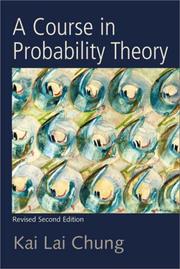
ISBN: 1281020826 9786611020828 008052298X 9780080522982 0121741516 Year: 2001 Publisher: San Diego : Academic Press,
Abstract | Keywords | Export | Availability | Bookmark
 Loading...
Loading...Choose an application
- Reference Manager
- EndNote
- RefWorks (Direct export to RefWorks)
Since the publication of the first edition of this classic textbook over thirty years ago, tens of thousands of students have used A Course in Probability Theory. New in this edition is an introduction to measure theory that expands the market, as this treatment is more consistent with current courses. While there are several books on probability, Chung's book is considered a classic, original work in probability theory due to its elite level of sophistication.
Probabilities. --- Probability --- Statistical inference --- Combinations --- Mathematics --- Chance --- Least squares --- Mathematical statistics --- Risk --- UmU kursbok
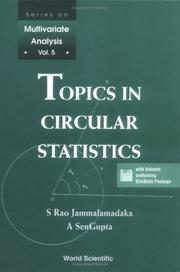
ISBN: 1281938017 9786611938017 9812779264 9789812779267 9789810237783 9810237782 9781281938015 Year: 2001 Publisher: River Edge, N.J. : World Scientific,
Abstract | Keywords | Export | Availability | Bookmark
 Loading...
Loading...Choose an application
- Reference Manager
- EndNote
- RefWorks (Direct export to RefWorks)
This research monograph on circular data analysis covers some recent advances in the field, besides providing a brief introduction to, and a review of, existing methods and models. The primary focus is on recent research into topics such as change-point problems, predictive distributions, circular correlation and regression, etc. An important feature of this work is the S-plus subroutines provided for analyzing actual data sets. Coupled with the discussion of new theoretical research, the book should benefit both the researcher and the practitioner.
Contents:
- Circular Probab
Circular data. --- Mathematical statistics. --- Mathematics --- Statistical inference --- Statistics, Mathematical --- Statistics --- Probabilities --- Sampling (Statistics) --- Data, Circular --- Statistical methods
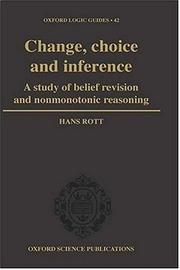
ISBN: 9780198503064 0198503067 Year: 2001 Publisher: Oxford : Clarendon ; Oxford University Press,
Abstract | Keywords | Export | Availability | Bookmark
 Loading...
Loading...Choose an application
- Reference Manager
- EndNote
- RefWorks (Direct export to RefWorks)
Choice (Psychology) --- Inference. --- Logic, Symbolic and mathematical. --- Nonmonotonic reasoning. --- Choice (Psychology). --- Inference --- Logic, Symbolic and mathematical --- Nonmonotonic reasoning --- Non-monotonic reasoning --- Algebra of logic --- Logic, Universal --- Mathematical logic --- Symbolic and mathematical logic --- Symbolic logic --- Ampliative induction --- Induction, Ampliative --- Inference (Logic) --- Reasoning --- Mathematics --- Algebra, Abstract --- Metamathematics --- Set theory --- Syllogism --- Psychology --- Logique mathématique --- Philosophie --- Artificial intelligence --- Logique --- Knowledge representation
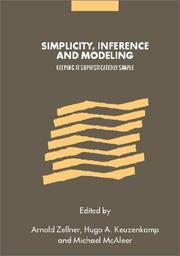
ISBN: 0521803616 0521121353 0511119593 0511041594 0511156715 0511329377 0511493169 1280154861 0511043813 1107123429 9780511041594 9780511043819 9780511119590 9780511493164 9780521803618 9781280154867 9780521121354 Year: 2001 Publisher: Cambridge ; New York : Cambridge University Press,
Abstract | Keywords | Export | Availability | Bookmark
 Loading...
Loading...Choose an application
- Reference Manager
- EndNote
- RefWorks (Direct export to RefWorks)
The idea that simplicity matters in science is as old as science itself, with the much cited example of Ockham's Razor, 'entia non sunt multiplicanda praeter necessitatem': entities are not to be multiplied beyond necessity. A problem with Ockham's razor is that nearly everybody seems to accept it, but few are able to define its exact meaning and to make it operational in a non-arbitrary way. Using a multidisciplinary perspective including philosophers, mathematicians, econometricians and economists, this 2002 monograph examines simplicity by asking six questions: what is meant by simplicity? How is simplicity measured? Is there an optimum trade-off between simplicity and goodness-of-fit? What is the relation between simplicity and empirical modelling? What is the relation between simplicity and prediction? What is the connection between simplicity and convenience? The book concludes with reflections on simplicity by Nobel Laureates in Economics.
Simplicity (Philosophy) --- Inference --- Econometrics --- Econometrics. --- Inference. --- Simplicity (Philosophy). --- Business, Economy and Management --- Economics --- Economics, Mathematical --- Statistics --- Ampliative induction --- Induction, Ampliative --- Inference (Logic) --- Reasoning --- Philosophy --- 117 --- 330.0151 --- 165.23 --- 330.115 --- 165.23 Kennis: begripsanalyse naar woordbetekenis; betekeningsvraagstuk --- Kennis: begripsanalyse naar woordbetekenis; betekeningsvraagstuk --- 330.115 Econometrie --- Econometrie
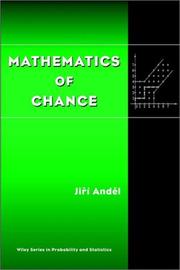
ISBN: 0471410896 Year: 2001 Publisher: New York : Wiley,
Abstract | Keywords | Export | Availability | Bookmark
 Loading...
Loading...Choose an application
- Reference Manager
- EndNote
- RefWorks (Direct export to RefWorks)
Probabilities --- 519.2 --- Probability --- Statistical inference --- Combinations --- Mathematics --- Chance --- Least squares --- Mathematical statistics --- Risk --- Probability. Mathematical statistics --- 519.2 Probability. Mathematical statistics
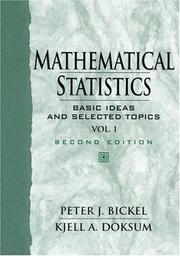
ISBN: 013850363X Year: 2001 Publisher: Upper Saddle River, N.J. Prentice Hall
Abstract | Keywords | Export | Availability | Bookmark
 Loading...
Loading...Choose an application
- Reference Manager
- EndNote
- RefWorks (Direct export to RefWorks)
Mathematical statistics --- 519.22 --- Mathematics --- Statistical inference --- Statistics, Mathematical --- Statistics --- Probabilities --- Sampling (Statistics) --- Statistical theory. Statistical models. Mathematical statistics in general --- Statistical methods --- Mathematical statistics. --- 519.5 --- 519.22 Statistical theory. Statistical models. Mathematical statistics in general
| Listing 1 - 10 of 54 | << page >> |
Sort by
|

 Search
Search Feedback
Feedback About UniCat
About UniCat  Help
Help News
News